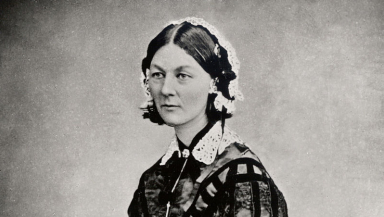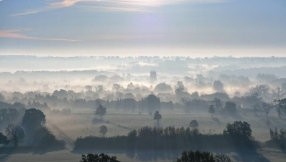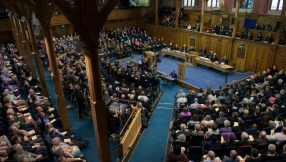
May 12 is a very important date in the Jewish calendar. It is known as Lag Be'Omer, the 33<sup>rd day of counting the Omer between Pesach and the receiving of the Torah 7 weeks later at Mount Sinai on Shavuot.
Lag Be'Omer is usually a school holiday in Israel and people flock to the most important religious site in the north of the country, Meron in Galilee, where the Torah sages Hillel and Shammai are reputedly buried, as well as the author of the mystical Zohar, Shimon bar Yochai.
What is amazing and moving is that Hillel and Shammai argued with each other all the time, 2,000 years ago when they lived, and both initiated schools of thought. Hillel was generally more liberal than Shammai, which is why in practise people tend follow Hillel, who said to a mocking Roman centurion: 'Do not do unto others what you would rather they didn't do to you – now go and learn!'
But this year, visiting Meron is forbidden due to the coronavirus and people are celebrating at home instead. Ironically, Lag Be-Omer is also special because the plague which afflicted the people in the time of another sage, Rabbi Akiba, miraculously stopped on that very day – today. Incidentally, Akiba is also buried in Galilee, in the holy town of Tiberias.
In the build-up to Lag Be'Omer, yesterday I taught the last chapter of the Book of Samuel. II Samuel 24 and 25 deal with the choice offered to King David for sinning against G-d's word. He is given a three-fold choice of punishment through the prophet Gad: famine, war or pestilence?
Maybe surprisingly, David chooses pestilence, because he says G-d is more merciful than man. If he chooses famine, as king he will never starve, but pestilence is an equalizer, he says – and in fact as we know from history, often plague kills the wealthy, living in big cities and who travel around, rather than the impoverished, who often don't get to travel much, if at all.
In order to atone for his sin, David is commanded to buy the threshing floor of Arunah, the Jebusite, where he built an altar which became the site of the Temple. And all this can be seen from the name Arunah, which is spelled in different ways in the Hebrew, and whose pronunciation is also ambivalent.
Is the word to be pronounced as Arona, to rhyme maybe with arnona (the dreaded council tax), or even worse corona? Or is it maybe Arvana, to rhyme with nirvana, a much more optimistic prospect?
But in verse 18, the word is spelled differently again and is pronounced Aranya which actually means 'the ark of the Lord'. Most people don't see this from the English translation but it's all there in the Hebrew text.
Through plague and sacrifice, maybe something meaningful will emerge, and that is also the lesson today of Lag Be'Omer, in which, because we are now experiencing a new plague, the Jewish community are encouraged to 'learn' rather than to visit the grave of revered teachers.
And as we have for the last seven weeks been participating in services, seminars, social gatherings, funerals and other activities zoomed out from those buildings, the home has once again become the hub of our activity, as encouraged by all those post-Temple time teachers, including Hillel, Shammai and Akiva nearly 2000 years ago.
In a BBC Radio 4 sermon for VE Day to mark the 200<sup>th anniversary of the birth of Florence Nightingale, which also takes place today, former Archbishop of Canterbury, Dr Rowan Williams, made the point that history doesn't start and finish. 1939 and 1945 are arbitrary dates as far as the Jews of Nazi Germany and Eastern Europe were concerned.
On VE Day 1945 so many Jews retrieved from concentration camps, starvation and holes where they had been hiding were actually displaced, lice-infected skeletons with no-one wanting to take them in, certainly not the countries which had treated them in this way to start with. At the other end, Hitler had come to power in 1933 and had written Mein Kampf (already translated into English) in 1923. So everyone knew what was going on and did nothing about it when they could have. No, history, never starts or finishes as such – we cannot divide years into 'periods' – we only do this for convenience – much like 'the science'.
The answer given by Hillel and Shammai, Akiva, Florence Nightingale, Rowan Williams and many others is that all we can do is serve. If religion, science, or other area of devotion or expertise turns us into celebrities, pundits, or 'sacred cow', then this isn't service any more, but simply an ego trip.
That is why we Jews should, in a way, be grateful to the Romans and, yes, Christians who hated us and forced us back into our own homes, so that the humble table became an altar, just as a simple threshing floor in Jerusalem became the altar of G-d. And this humble altar seeded the Temple which (after 2,000 years of forced exile by various oppressors, culminating in the British) my daughter who lives in Jerusalem is visiting today instead of making for Meron, half an hour's walk from her home.
True service is the ability to 'get on with it' in a crisis, which is what many of us have been trying to do during this period of plague, shut-down and enforced solitude.
So, just as VE Day was simply the beginning and not the end, how can we continue the legacy of Florence Nightingale? The 'lady with the lamp' lit up the lives of many, just as bonfires generally light up our lives on Lag Be'Omer. And as I write this from my drizzly Salford home, I am aware that the 33<sup>rd day of the Omer, today, is also entitled 'Humility in Humility'.
These are the questions specifically chosen to be asked on Lag Be'Omer and which we could do well to consider:
Is my humility humble, or is it yet another expression of arrogance? Do I take too much pride in my humility? Do I flaunt it? Is it self-serving? Is my humility part of a crusade or is it genuine?
Just being humble for its own sake is difficult, but this is what Lag Be'Omer is all about, and this, I would submit, is also the legacy of our greatest nurse, Florence Nightingale who was born 200 years ago today.
Dr Irene Lancaster is a Jewish academic, author and translator who has established university courses on Jewish history, Jewish studies and the Hebrew Bible. She trained as a teacher in modern Languages and Religious Education.













